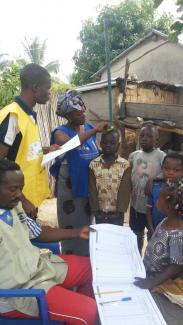Gender Study Phase Two: Qualitative Gender Analysis and Gender Strategy
The gender strategy contains an actionable set of recommendations, based on literature and quantitative and qualitative data, intended to contribute to the overall achievement of Act to End NTDs | West program objectives as well as to increase gender equality throughout program implementation.
Objectives
- Everyone, regardless of sex, disability status, ethnicity, religion, language, national or social origin, and economic status will have equal and improved access to treatment for onchocerciasis, lymphatic filariasis, soil-transmitted helminthiasis, schistosomiasis, and trachoma as relevant, through the 11 Act | West program countries.
- Increase knowledge of diseases, access to information on mass drug administration (MDA) timing and locations, and education on potential side-effects to enable people to make informed decisions regarding participation in MDA.
- Promote and support gender equitable participation in the role of community drug distributor (CDD), removing barriers for women to safely and inclusively participate as CDDs in NTD programs.

Type
Guidelines or Reference Manual
Year of publication
Disease
All Preventive Chemotherapy NTDs
Country
All Countries, Benin, Burkina Faso, Cameroon, Cote d’Ivoire, Ghana, Guinea, Mali, Niger, Senegal, Sierra Leone, Togo
Focus Areas
Mass Drug Administration (MDA), MDA implementation, Community outreach, NTD Capacity Building, Monitoring, Evaluation, Research, Learning and Adapting (MERLA), Learning & quality improvement, Operational research
Partners
FHI360